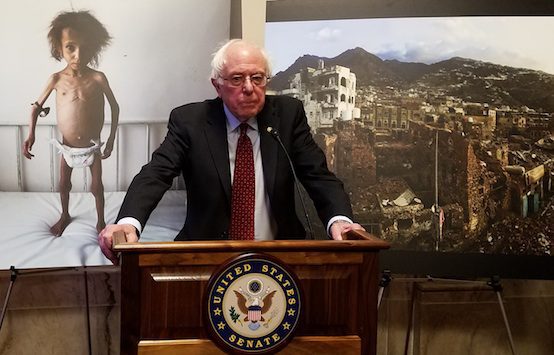Being Honest About U.S. Foreign Policy

There was a statement that Sanders made at the debate last night that deserves more attention, because it gets at the heart of the manufactured controversy over Sanders’ own past statements and the glaring hypocrisy that defines so many of our foreign policy discussions. Sanders said this:
Excuse me, occasionally it might be a good idea to be honest about American foreign policy [bold mine-DL], and that includes the fact that America has overthrown governments all over the world in Chile, in Guatemala, in Iran. And when dictatorships, whether it is the Chinese or the Cubans do something good, you acknowledge that. But you don’t have to trade love letters with them.
Several of Sanders’ opponents last night were not interested in being honest about U.S. foreign policy. If they had been interested, they would have to admit that U.S. politicians acknowledge positive developments that take place under authoritarian regimes all the time, and most of the time they do this to justify U.S. support for those governments. The fact is that both Bloomberg and Biden have sometimes said very positive things about repressive authoritarian states without any caveats. They haven’t prefaced their praise by saying that this is an oppressive government that violates human rights. They didn’t say anything that could be construed as a criticism. Biden touted Mubarak as an ally and refused to call him a dictator just weeks before his ouster. Bloomberg praised the Saudi crown prince and his Vision 2030 plan last year without qualification:
But Bloomberg has praised another murderous dictator – Saudi Crown Prince Mohammed bin Salman, known as MBS – as recently as last year, long after he was implicated in the murder of Post contributing columnist Jamal Khashoggi.
In a September 2019 interview with Arab News, Bloomberg praised Mohammed bin Salman’s “Saudi Vision 2030” plan, focusing especially on its loosening of some restrictions on Saudi women. “I have had a number of women come up to me and say you don’t understand this is the best thing that has ever happened to Saudi Arabia because half the population was cut out and now they are going in the right direction,” Bloomberg said. He lauded King Salman and MBS for their efforts “to take that country into the new world,” saying, “They have made progress going in the right direction.”
He didn’t acknowledge that MBS had jailed and tortured some prominent Saudi women activists. And Bloomberg didn’t mention that 11 months earlier, U.S. permanent resident and Saudi journalist Khashoggi was murdered and dismembered by MBS’s own henchmen. International investigators and the CIA later concluded that the killing was a premeditated crime ordered by MBS himself.
This wasn’t just a case of Bloomberg letting optimism get the better of him. By the time he said these things, the increasingly repressive nature of the Saudi government under Mohammed bin Salman was well-known. The many war crimes and atrocities committed by his government in Yemen had been in the news for years (and they continue to happen), Khashoggi’s murder had happened almost a year earlier, and he could not have missed the stories about the ongoing detentions and torture of political activists, including Loujain al-Hathloul, who is still imprisoned to this day. As far as political rights are concerned, Saudi Arabia has clearly been moving in the wrong direction, but Bloomberg chose to ignore all of that.
It would be fair to acknowledge that there have been some positive changes in Saudi Arabia over the last few years at the same time that the crown prince has been cracking down on dissent, killing critics, and consolidating power, but if you’re going to talk about those changes it would be important to state opposition and condemnation of the Saudi government’s myriad abuses. On that occasion, Bloomberg only offered praise, and there is no evidence that he expressed any concern about Saudi government crimes and abuses until he was starting to run for president. The Saudi Arabia example is a telling one, because for the last several years many American politicians and media outlets embarrassed themselves by lavishing nothing but praise on the Saudi crown prince for his “reforms.”
As a matter of U.S. policy, Saudi Arabia has been given a pass for the many atrocities it has committed in Yemen because the current administration places more value on selling them weapons and the previous administration wanted to “reassure” them of our support. The issue here is not just the double standard applied to U.S. clients, but that many of our leaders give these governments a pass on their human rights violations and war crimes in order to justify U.S. policies of support for those clients that cause even more death and destruction. In other words, when U.S. politicians praise authoritarian clients, it is usually part of an effort to whitewash the client government’s record and to justify providing them with more weapons and aid. There are real consequences and human costs when politicians turn into cheerleaders for these governments.
Biden was vice president when the shameful policy of supporting the war on Yemen began, and when he was part of the Obama administration there is no evidence that he opposed this policy or spoke against it at any point. He has since turned against that policy, but he had nothing to say about it when he could have done something about it. While Bloomberg was singing the crown prince’s praises, Sanders has been one of the leading critics of the Saudi government’s crimes and an opponent of U.S. enabling of those crimes. Which one would you rather have making foreign policy decisions as president: Mohammed bin Salman’s cheerleader or one of his most vocal critics?
Comments